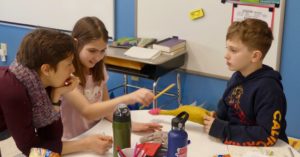5 Ways to Help Bring Ease to Back-to-School
By Anne Louise Wagner
How will the back-to-school transition go this fall? We’re all still learning! No matter what the start of school looks like for you and your family, there are some universal ideas about how to help your students and their teachers. We spoke with several educators–who are also parents–to talk about what they think will be helpful for the Fall. These concepts were important before, and now more than ever are helpful to keep in mind.
1. Remember that we’re all striving for the same goals of getting back to the learning and growing.
We can assume that this year’s start will be chaotic. Emotions and anxiousness – for all of us – will be elevated above a “normal” year. It will be helpful to remember that the reason we’re all one community is our mission of, and commitment to, the students and their growth. If we can hold this as common ground, we can collaborate as a team to help young people learn skills and knowledge for their future.
- Putting this into action: Try to monitor and manage your own emotions and anxiousness when a challenging moment arises. As examples, if you need to connect with a teacher or staffer, or you and your student are confused about information provided, remind yourself of this shared larger goal in order to create a more positive conversation and outcomes, both with the school and with your child. You’ll also be a better role model for your child while navigating through the process of getting clarity.
2. Know how to help teachers get to know your child.
Teachers need to be connected with their students to build successful and trusted relationships with them. They also need a clear sense of where your child is academically, socially, and emotionally by being present, engaging in the work, and communicating with them. When something out of the norm comes up, it’s often a common reaction for parents to insert themselves in between the child and teacher to facilitate the issue through to a solution. But… students can practice communicating and advocating for themselves! Before you reach out to the teacher, consider staying out of it and using it as a growth exercise for your child.
- Putting this into action: When your child is experiencing difficulty, support them in scheduling their own meeting with their teacher or guidance counselor and relevant school support staff. If you feel you need need to be involved, have your child present and participating whenever appropriate. (And also see #1 around managing your own behavior and serving as a role model, if you are involved.)
3. Take the time to get familiar with the communication channels set up for you.
There may be multiple ways for parents and caregivers to receive and share information with the district, school and teachers. As the school year begins, check out the different communication systems in place and ask for support if you get hung up using them. Building these links before something urgent arises is always helpful.
- Putting this into action: Set up apps, save numbers in your phone and learn from your child’s teachers the easiest and best ways to contact them. Chances are you’ll get a faster response if you’re using the system that they prefer and check often. Also set up a safe system (on a device or piece of paper) to track school-related websites, your usernames, passwords, and any other important details for your communication for the school year. Support your child to do the same.
4. Learning is all about practice – which means it’s messy and involves mistakes.
Learning happens when we push ourselves, which means we inherently feel discomfort. The right level of challenge leads to growth. There are always hard moments and slip-ups, and in these situations we need to remain encouraging and guide students to seek support from their teachers.
- Putting this into action: If your child is getting frustrated while working on a project, support them in problem solving what is the next responsible step. Once they are calm, ask them some questions like:
What is at the heart of the issue?
What do you have control over?
What ways may you need to ask for help or support?
In order to further help their learning, revisit the situation afterwards to discuss in hindsight what might be good to do differently in the future.
5. Find patience with yourself, your child and all involved in this transition.
Recognize that back-to-school is a transition and potentially will include multiple phases. We all may need support to process the changes and emotions throughout the school year. This stress may show up in a variety of ways. In what ways can you be open and help your child find strategies within this transition? We do this best when we are able to be grounded, so taking the time to care for yourself is important, too.
- Putting this into action: What is something you know has helped you set yourself up for the week or recuperate afterwards? Set a goal around how you can incorporate that into your routine more often. For example, some people commit to stretching after getting out of bed each weekday morning. Be sure it’s do-able and actually helpful for you!
No matter what happens during the back-to-school transition, so much of the successes or challenges will lie in all of our abilities to build relationships and communicate with each other. And our kids will be watching, so let’s lead by example.
